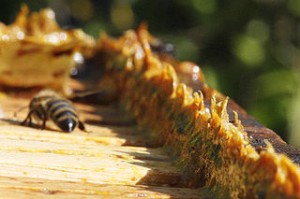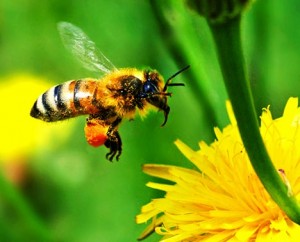 Propolis is the sticky resinous substance that bees collect from plants and trees and which gets all over your hands and clothes when inspecting a bee hive. Propolis is produced by the trees and plants to protect their buds from, bacteria, fungus and most insects. The composition and colour of propolis varies from plant to plant and therefore colony to colony and region to region. Propolis is most commonly an orangey/brown colour.
Propolis is the sticky resinous substance that bees collect from plants and trees and which gets all over your hands and clothes when inspecting a bee hive. Propolis is produced by the trees and plants to protect their buds from, bacteria, fungus and most insects. The composition and colour of propolis varies from plant to plant and therefore colony to colony and region to region. Propolis is most commonly an orangey/brown colour.
Bees use propolis to seal up small spaces throughout the hive, bigger spaces are sealed with wax comb. Propolis is sticky above 20 °C (68 °F) and becomes brittle and hard below that temperature. As a result forager bees tend to prefer to collect propolis in warmer temperatures. The bees collect the propolis using their mandibles to scrape the substance from the plants. They then pass the propolis from their mandibles to their forelegs, then to the inner surface of the middle leg or basitarsus. The propolis is then stored for flight in their pollen baskets or corbiculum on their back legs.
On returning to the hive with their load of propolis they go to the part of the hive where it is required. The propolis is removed by other house bees. Just as with pollen, nectar and water the bees will perform a dance to pass on the exact location of the propolis to other bees.
In sealing up small holes and entrances in the hive, the bees are strengthening the structure of their home as well as limiting the possible entrance points for predators and it is believed reducing vibration. In addition, whilst bees will remove any dead bees or small predators from a hive, bigger creatures such as small mice or lizards, which have been attacked and killed but are too heavy to remove will be shrouded in a propolis cocoon. By doing so the bees prevent disease and bacteria spreading from the decaying body.
The bees will also coat the inside of the hive with a thin layer, or varnish of propolis and also coat the inside of a brood cell. This is believed to be a way of using the known anti bacterial, antiviral and antimicrobial properties of propolis to keep the colony clean and healthy and free of disease.
Some strains of bees such as Caucasians use more propolis than others and some beekeepers will not keep them for this reason. Since beekeepers tend to hate having to deal with large amounts of sticky propolis there has been a tendency to favouring and breeding from lower propolis producing colonies in recent decades. Some scientists now suggest that this reduction in propolis use could be interfering with the bees natural weapon against diseases and be contributing to the rise in pests and diseases currently damaging bee colonies worldwide.
Human use of propolis
There is a growing interest in propolis and its natural benefits for humans. Many health stores sell propolis supplements and propolis can now even be found in some toothpaste produced by major toothpaste manufacturers, promoting in particular healthy gums.
Below are some propolis based products you might like to check out

